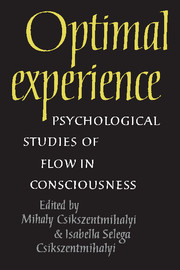Book contents
- Frontmatter
- Contents
- Acknowledgments
- Contributors
- I A THEORETICAL MODEL OF OPTIMAL EXPERIENCE
- 1 Introduction
- 2 The flow experience and its significance for human psychology
- 3 Sociological implications of the flow experience
- 4 Flow and biocultural evolution
- II VARIETIES OF THE FLOW EXPERIENCE
- III FLOW AS A WAY OF LIFE
- IV THE MEASUREMENT OF FLOW IN EVERYDAY LIFE
- References
- Name index
- Subject index
4 - Flow and biocultural evolution
Published online by Cambridge University Press: 05 June 2012
- Frontmatter
- Contents
- Acknowledgments
- Contributors
- I A THEORETICAL MODEL OF OPTIMAL EXPERIENCE
- 1 Introduction
- 2 The flow experience and its significance for human psychology
- 3 Sociological implications of the flow experience
- 4 Flow and biocultural evolution
- II VARIETIES OF THE FLOW EXPERIENCE
- III FLOW AS A WAY OF LIFE
- IV THE MEASUREMENT OF FLOW IN EVERYDAY LIFE
- References
- Name index
- Subject index
Summary
This chapter is about the role of the flow experience in the construction and complexification of the self, and, in a broader sense, its role in biological and cultural evolution. Some of the theoretical assumptions underlying this relationship have already been developed elsewhere (e.g., Massimini & Calegari 1979; Massimini 1982; Csikszentmihalyi & Massimini 1985; Csikszentmihalyi 1987b). The main contention is that people tend to replicate optimal experiences more often relative to other experiences in order to maintain an ordered state of consciousness.
The characteristics that make the flow experience a negentropic state of consciousness – high concentration and involvement, clarity of goals and feedback, and intrinsic motivation, all made possible by a balance between perceived challenges and personal skills – have already been described theoretically and confirmed empirically (Csikszentmihalyi 1975b, 1982a; Csikszentmihalyi & Graef 1979). One of the purposes of this chapter is to show the underlying sameness in the phenomenology of this experience by reporting examples from interviews with individuals in very different cultures.
In addition, by considering which activities produce flow and the number of people in each sample who find flow in various activities, it is possible to begin estimating how this experience might influence biological and cultural evolution. For example, when a person learns to experience flow in the context of a religious vocation, as in one of the samples considered in the following pages, the replication of cultural instructions having to do with prayer, meditation, and ritual ceremonies may take precedence even over the replication of that person's biological instructions.
- Type
- Chapter
- Information
- Optimal ExperiencePsychological Studies of Flow in Consciousness, pp. 60 - 82Publisher: Cambridge University PressPrint publication year: 1988
- 62
- Cited by



